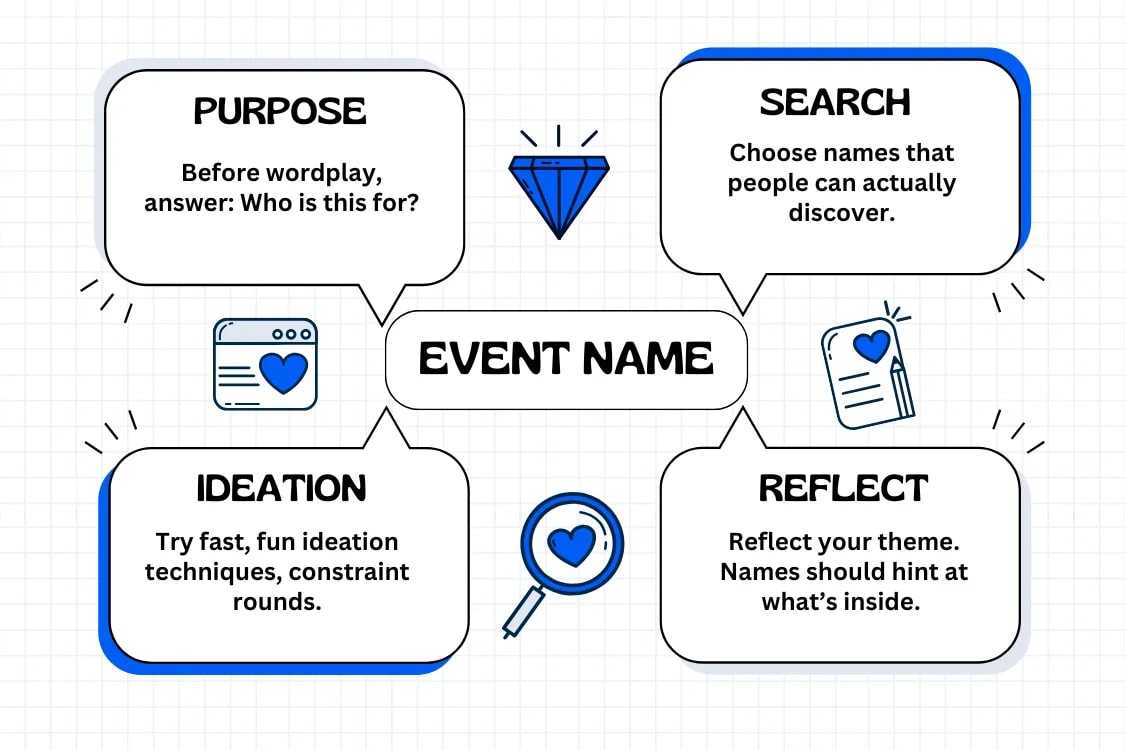
Your event name is the tiny headline that does a huge job. It sets the tone, signals the vibe, and makes people decide—at a glance—whether to click, share, or skip. A strong, strategic name doesn’t just look good on a poster; it boosts brand recognition, attracts the right attendees and sponsors, and makes your marketing more memorable across every touchpoint.
In this guide, you’ll learn how to name an event with confidence. We’ll cover smart brainstorming techniques, the essential traits of a great name, a simple testing plan, and 15 creative examples you can riff on for conferences, festivals, workshops, and retreats.

The Loopyah Content Team shares expert insights, practical guides, and industry updates to help event organizers create unforgettable experiences and stay ahead in the event planning world.
First impressions: Your name is often the first (and sometimes only) cue prospects see in feeds, inboxes, and search results. It needs to be easy to process, yet distinctive enough to stand out.
Brand identity: Treat your event name like a core brand asset. Consistency and clarity help people build quick mental shortcuts to your event—meaning they recognize and recall it faster across ads, emails, websites, and on-site experiences. Kantar’s research on distinctive brand assets underscores this point: clear, consistent assets drive salience.
Marketing impact: Names influence performance. Fluent, easy-to-say names can boost instant likeability, while slightly less fluent names can increase memorability—useful for long-term recall. Calibrate based on your goal (fast appeal vs. stickiness).
Setting expectations: Names signal what the event is, who it’s for, and how it will feel. Sound matters too—phonetic cues can suggest energy, sophistication, intimacy, or power. Use that to your advantage to encode your positioning.
Clarity leads to creativity. Before wordplay, answer: Who is this for? What value or transformation will they get? How should it feel (premium, playful, intimate, energetic)? Turning user needs into “How might we” prompts sparks better ideas than debating puns. Run short, structured brainstorms—ideation first, judgment later.
Choose names that people can actually discover. Use tools like Google Trends and your site’s search insights to compare terms, uncover related searches, and see regional phrasing. If your community searches “data summit” more than “analytics forum,” use that language—or blend it into a distinctive compound.
As you shape your shortlist, think ahead to how the name will perform in ads and SEO landing pages. When you’re ready to promote, explore our tips to boost reach and conversion on your campaigns with Loopyah’s marketing tools.
- Mind mapping: Start with your event’s promise (e.g., “Connected Commerce”) and branch into themes, emotions, verbs, places, and metaphors.
- Word association sprints: Set a 5-minute timer and list 50 related words. Repeat across your team, then remix into compounds and phrases.
- Creative warm-ups: Use exercises like “30 Circles” to boost fluency, then run a “Dream/Gripe” session to translate attendee desires and pain points into name criteria.
- Constraint rounds: Force formats—e.g., alliteration (Data Dive), metaphor (Rhythm & Brews), future-forward compounds (Future Forward Summit). Constraints make choosing easier.
Names should hint at what’s inside. Tech sprint? Sharper, energetic sounds. Wellness retreat? Softer, soothing sounds. Food festival? Sensory cues. Aim for truth-in-advertising: if your name promises “Global,” the program, speakers, or audience mix should match.
Once you have 5–10 contenders, create lightweight landing pages or RSVP forms and test interest. Loopyah makes it simple to publish and sell quickly when you’ve picked a winner .
If people stumble saying or spelling it, they’ll skip it. Favor short, pronounceable words and straightforward structures. Research shows fluent phrasing boosts immediate likeability—great for ads and inbox scanning.
Make sure the name fits the content and audience. “CloudOps Camp” signals hands-on sessions for operators. “Mindful Motion Retreat” signals wellness + movement. Irrelevant names erode trust and drag conversion.
Stand out without getting weird. Before you fall in love, search for look-alike and sound-alike events. Check social platforms and past editions to avoid confusion or accidental piggybacking.
Light poetic devices help. Alliteration (Data Dive), rhyme, or rhythmic phrasing can boost recall—just don’t sacrifice clarity. Pair phonetics with your vibe: front vowels can feel nimble (Sprint, Swift), while deeper back vowels can feel weighty or premium (Bold, Forge).
Names are even stronger when they ladder into your on-site and digital identity—low-key, consistent branding across signage, presentations, and social touchpoints reinforces memory without shouting.
Use these as prompts, not templates. Adjust to your theme, location, or audience.
InnovateTech Summit (Conference): Clear domain + future-facing verb conveys progress and thought leadership; easy to scan and search.
Bloom Music Fest (Festival): Evokes growth and energy; “Bloom” suggests a spring/summer vibe and discovery of new artists.
ArtSpark Workshop (Workshop): Short, punchy compound; “Spark” signals ignition and creativity in a hands-on format.
Globalize Conference (Conference): Sets an explicit scope (cross-border, multi-market); works if your speakers/attendees are truly international.
Future Forward Summit (Conference): Alliteration + optimism; reads like a flagship strategy event with C-suite appeal.
Creative Canvas (Workshop): Metaphor clarifies hands-on making; great for design, painting, or content creation sessions.
Rhythm & Brews Fest (Festival): Playful, sensory, and social; signals live music + craft beverages in one compact phrase.
CodeCraft (Workshop): Maker language plus technical focus; implies skill-building and pride in craftsmanship.
EcoVenture Summit (Conference): Blend of “eco” and “venture” suggests sustainability + business; ideal for climate-tech audiences.
Mindful Motion Retreat (Retreat): Soft, soothing sounds match wellness positioning; expectations are clear and inclusive.
Digital Dynamics Conference (Conference): Signals movement and change in digital; professional tone suits B2B marketing or IT.
Culinary Canvas Workshop (Workshop): Sensory + artful; fits cooking, plating, or food photography masterclasses.
Indie Lens Film Fest (Festival): “Lens” anchors the medium; “Indie” clarifies the niche and curatorial stance.
Data Dive Conference (Conference): Memorable alliteration; implies depth and hands-on analysis—a good fit for analysts and engineers.
Sustainable Steps Summit (Conference): Purpose-led and actionable; “Steps” hints at frameworks and roadmaps.
Share your top 3–5 names with a representative slice of your audience. Ask specific, decision-driving questions:
What do you expect at an event with this name?
How easy is it to say and spell?
Which feels most relevant to your needs?
Which would make you most likely to click RSVP?
If you have multiple segments (e.g., decision-makers vs. practitioners), compare results by persona before deciding.
Do “knockout” searches to avoid conflicts: look for identical or confusingly similar event names, then search trademarks. In the U.S., start with the USPTO’s database. In Australia, you can search via the IP Australia website. Also check domain availability and social handles so you can secure consistent identities.
- Do a 5–10 user memory test: show a name for 5 seconds, then ask people to recall it 10 minutes later. Names that stick tend to perform better in the wild.
- A/B test what the market sees: run two landing pages or ad variants using different names and compare CTR, time on page, and RSVP rate. Loopyah makes it easy to publish event pages and take payments once you’ve validated a winner .
- Test email subject lines with alternate names to see which drives higher opens and clicks, then follow up with tailored messaging. If you’re emailing past attendees, keep communications timely and relevant .
Expand first, then narrow. Generate volume and variety—then let data and audience fit break the tie.
Generic names: “Tech Conference 2025” is forgettable and hard to differentiate in search. Add specificity (theme, audience, benefit).
Misleading names: Don’t call it “Global” if it’s regional. Expectations should match agenda, speakers, and scope.
Hard to say or spell: If it’s tongue-twisting or ambiguous to spell, you’ll lose word-of-mouth and search traffic.
Cutesy nicknames: Inside jokes can depress engagement at scale. Favor authoritative, purposeful naming.
Ignoring cultural sensitivities: Screen for inclusivity, potential slang, and translation issues to avoid offense or confusion.
The best event names are simple, searchable, and aligned with your experience—then validated by your audience and the market. Start with purpose and people, brainstorm broadly with structured techniques, shortlist against
clarity
relevance
uniqueness
memorability
And make sure you pressure-test before you print banners.
When you’re ready to take your favorite name live, promote confidently and open RSVPs. You can set up your listing and start selling in minutes on Loopyah and use our promotion tools to get the word out .